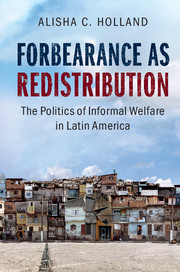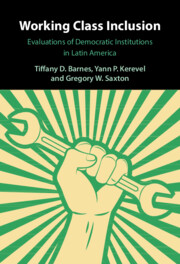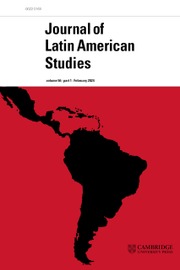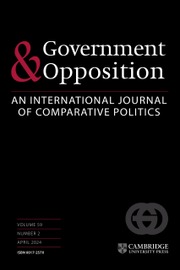
Forbearance as Redistribution
The Politics of Informal Welfare in Latin America
$36.99 (P)
Part of Cambridge Studies in Comparative Politics
- Author: Alisha C. Holland, Princeton University, New Jersey
- Date Published: June 2017
- availability: Available
- format: Paperback
- isbn: 9781316626351
$
36.99
(P)
Paperback
Other available formats:
Hardback, eBook
Looking for an examination copy?
If you are interested in the title for your course we can consider offering an examination copy. To register your interest please contact collegesales@cambridge.org providing details of the course you are teaching.
-
Why do governments tolerate the violation of their own laws and regulations? Conventional wisdom is that governments cannot enforce their laws. Forbearance as Redistribution challenges the standard interpretation by showing that politicians choose not to enforce laws to distribute resources and win elections. Alisha Holland demonstrates that this forbearance towards activities such as squatting and street vending is a powerful strategy for attracting the electoral support of poor voters. In many developing countries, state social programs are small or poorly targeted and thus do not offer politicians an effective means to mobilize the poor. In contrast, forbearance constitutes an informal welfare policy around which Holland argues much of urban politics turns. While forbearance offers social support to those failed by their governments, it also perpetuates the same exclusionary welfare policies from which it grows.
Read more- While most books look at tax-based social policies, this book proposes a new view of welfare states in the developing world
- Using a multi-method approach, the book combines survey data and extensive fieldwork to test the arguments
- Shows how politicians manipulate enforcement to win votes, enabling readers to make sense of why some laws go unenforced in developing countries
Awards
- Co-Winner, 2018 Herbert Jacob Book Prize, Law and Society Association
Reviews & endorsements
'This book is a gem and makes a crucial contribution to our understanding of distributive politics. Holland’s discussion of the distributive implications of variation in forbearance for poor and rich citizens is brilliant.' Maria Victoria Murillo, School of International and Public Affairs, Columbia University
See more reviews'When do governments choose to exercise forbearance and tolerate violations of the law? This question is at the heart of this painstakingly well-executed investigation of government responses to squatting and street vending in three Latin American cities. This book is an instant classic.' Hillel Soifer, Temple University, Philadelphia
'When we think of law being selectively applied in Latin America, our minds call up accounts of the wealthy and the powerful getting away with murder. This meticulously executed book turns the tables, showing how the state sometimes withholds enforcement to achieve redistributive ends. This is the most interesting twist on the politics of social provision and the rule of law to come along in many years.' Daniel M. Brinks, University of Texas, Austin
'This is one of those rare books that changes forever the way you think about an issue, in this case the endemic and enduring informality found across the developing world.' Ben Ross Schneider, Massachusetts Institute of Technology
‘I found the book to be a very important contribution to the literature in the Global South on welfare provision, urban governance and electoral theory since it sheds light on the bi-directional complex relationship between the state and society, using housing and employment as a lens to study the political structures of cities.’ Irene Farah, Urban Studies
Customer reviews
Not yet reviewed
Be the first to review
Review was not posted due to profanity
×Product details
- Date Published: June 2017
- format: Paperback
- isbn: 9781316626351
- length: 398 pages
- dimensions: 228 x 152 x 22 mm
- weight: 0.57kg
- contains: 50 b/w illus. 10 tables
- availability: Available
Table of Contents
1. An electoral theory of forbearance
2. Who votes for forbearance
3. What enables forbearance: inadequate social policy and squatting
4. When politicians choose forbearance: core constituencies and street vending
5. Where forbearance occurs: the role of electoral institutions
6
Why forbearance continues: path dependencies in the informal welfare state
7. How forbearance ends: lessons from Turkey.
Sorry, this resource is locked
Please register or sign in to request access. If you are having problems accessing these resources please email lecturers@cambridge.org
Register Sign in» Proceed
You are now leaving the Cambridge University Press website. Your eBook purchase and download will be completed by our partner www.ebooks.com. Please see the permission section of the www.ebooks.com catalogue page for details of the print & copy limits on our eBooks.
Continue ×Are you sure you want to delete your account?
This cannot be undone.
Thank you for your feedback which will help us improve our service.
If you requested a response, we will make sure to get back to you shortly.
×





